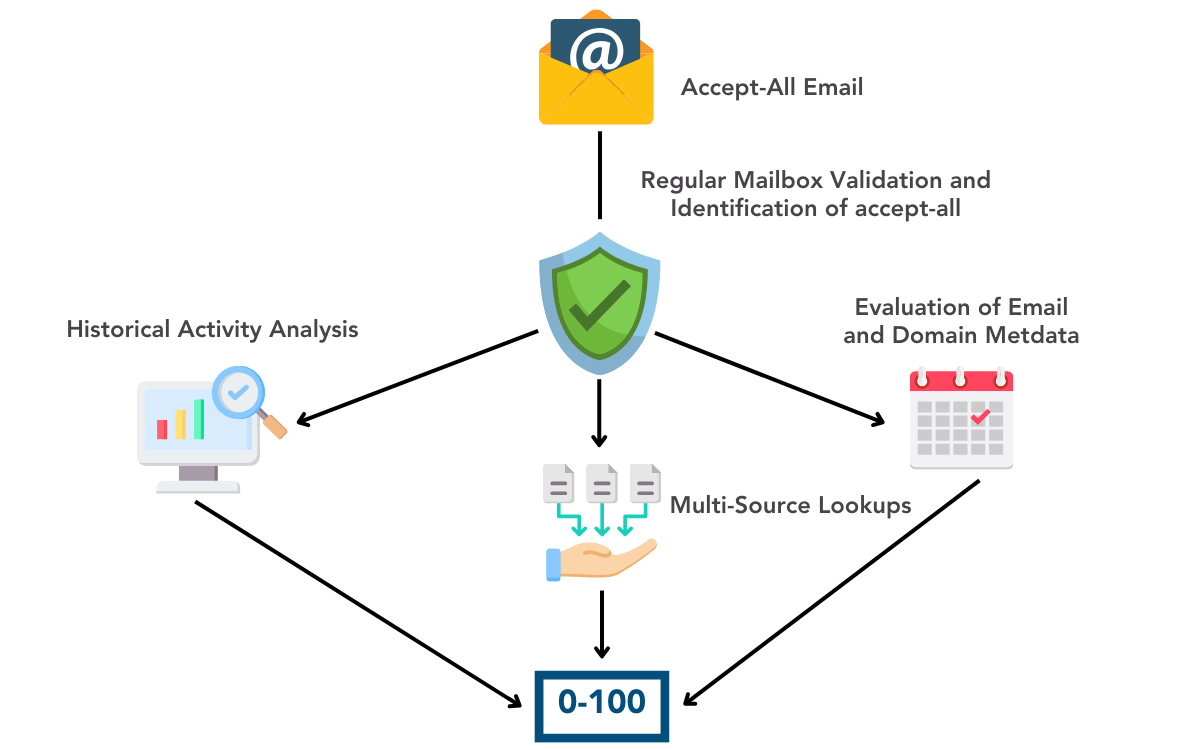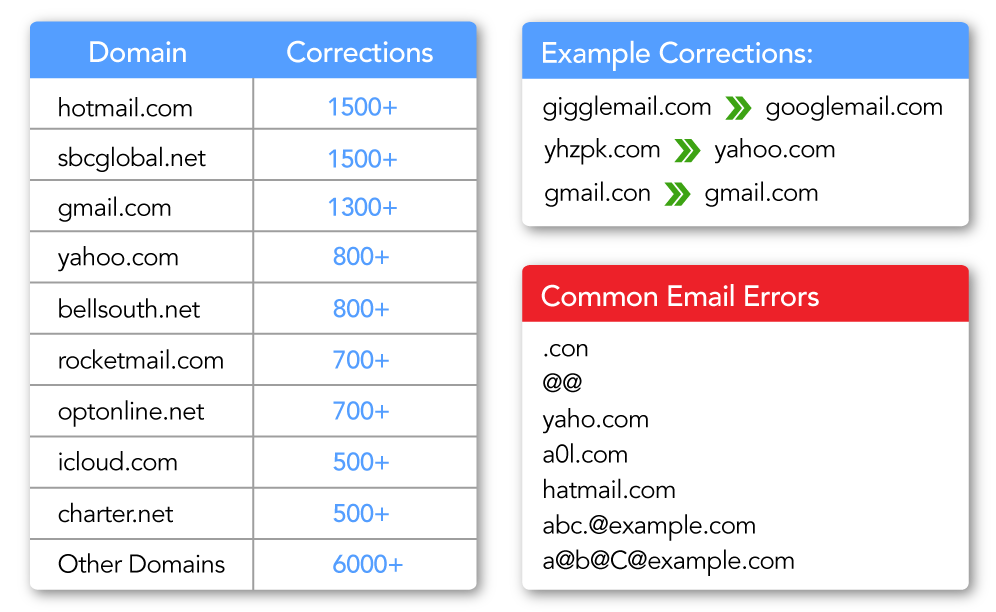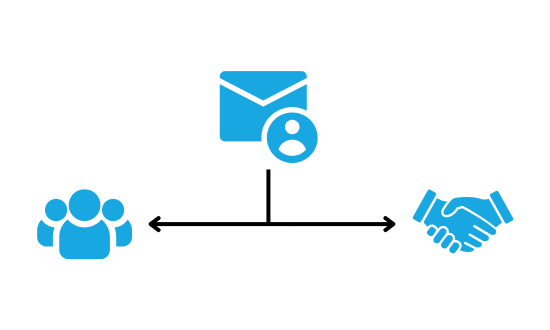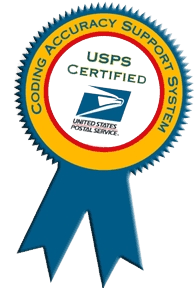Email Verification
Validate, standardize & score the deliverability of international emails in real time.
The Simple Solution to Validate Email Addresses in Real-time and Improve Email Deliverability. Increase deliverability, avoid high bounce rates and blacklisting, and protect your valuable sender reputation.
By incorporating email validation and verification tools at point of entry or in batch, you can:
- Reduce bounce rates
- Improve deliverability and engagement
- Reduce email marketing uncertainty
- Boost ROI
What We Do
Global Email Verification
- Ping each email in real time to ensure it is active and can receive mail to ensure a successful campaign.
- Improve deliverability by correcting typos, misspelled domains, and illegal characters that lead to high bounce rates.
- Reduce fraud by confirming only valid, not fake emails enter your systems.
- Protect your web reputation by avoiding email addresses and domains that are likely to flag you as a spammer.
- Maintain CAN-SPAM compliance with FCC mobile domain detection.
- Check against domain authentication protocols SPF, DKIM and DMARC.
- Identify a business or personal email based upon the domain.
Email Verification Features
Deliverability Confidence Score
Measure deliverability with precision. Our score scales from 0-100, offering a dynamic score to simplify marketing decisions and protect your sender reputation.
Predictive Accept-All Validation
Go beyond basic detection of accept-all addresses. Our predictive validation determines deliverability potential, minimizing risks in sending when leveraging the Deliverability Confidence Score.
Clear and Actionable Result Codes
Quickly understand and categorize email types with our intuitive result codes—no guesswork required.
Syntax and Domain Correction
Global Email corrects syntax first, ensuring each email address is validated accurately. Robust syntax rules and domain correction algorithms can correct common typos and improve the user experience.
Melissa G2 Awards
Always recognized and praised





Exclusive Validation Features
Deliverability Confidence Score
A simple to use, 0-100 deliverability score which also powers features such as our Predictive Accept-All validation.
Configurable Response Times
Configurable validation modes and timeouts help balance speed with precision where needed.
Threat Intelligence
Identifies domains that have been blacklisted for some form of malicious activity e.g. phishing or malware.
Mobile Email Detection
Identifies mobile emails that are protected by FCC and CAN-SPAM regulations. Sending unsolicited emails to these addresses can incur heavy fines.
Complainer Detection
Detects whether the mail provider is notorious for quickly marking unsolicited messages as a spam email, these are known as protected mailboxes.
Email Breach Detection
Identifies if, and how many times, an email address has been involved in a data breach in the past.
GDPR/CCPA Detection
Identifies email addresses that may be subject to privacy laws such as GDPR or CCPA.
Suspicious Character Detection
Identifies and removes potentially harmful characters that are not typically found in email addresses.
Domain Authentication Methods
Identifies how mail servers authenticate senders, allowing you to meet requirements and ensure delivery.
Core Validation Capabilities
Real-Time Email Mailbox Verification
Spam Trap/Honeypot Detection
Accept-All/Catch-All Detection
Role Address Detection
Typo & Syntax Correction
WHOIS/RDAP Information
Try It Now
Verify an email address
Deliverability Confidence Score (DCS)
Our Deliverability Confidence Score (DCS) combines a range of variables and email validation methods to predict the likelihood that a message will successfully reach its intended inbox. The DCS consolidates the validation results and simplifies it to a score from 0 to 100. This score helps you focus on emails that are not only valid but also more likely to be active and engageable. Leveraging DCS to refine your email marketing lists will ensure you reduce bounces and increase ROI.
Determining Factors for DCS:
- Validation Status - The overall status as well as any special flags associated with an email.
- Email Metadata - Information such as email age and historical engagement provides valuable insights into the email’s activity level.
- Domain Information - The type and security architecture of a domain help predict any complications with email delivery.

Predictive Accept-All Validation
Our Predictive Accept-All Validation feature offers a unique approach to evaluating emails hosted on accept-all servers. While these servers might typically mask inactive or invalid addresses, our proprietary Predictive Accept All algorithm analyzes patterns and traces of historical activity, giving users a reliable window into the likelihood of successful delivery.
- Accept all domains are configured to accept emails sent to any address, regardless of whether that specific address actually exists or is inactive.
- The predicted deliverability of an accept all mailbox will be reflected by the Deliverability Confidence Score (DCS) for that email.

Syntax Checking and Domain Correction
Utilizes state-of-the-art fuzzy matching and data correlation algorithms to automatically correct common email errors, such as misspelled domains, outdated providers, and syntax mistakes.
Global Email will validate the corrected and standardized version of the input email. By identifying and fixing typos like “gamail.com” to “gmail.com” prior to validation, the system ensures that each email address is accurate before it’s verified, leading to better results and enhanced mailing lists.
- General Syntax Checking - Enforces universally accepted email syntax rules and standardizes the email address.
- Domain Corrections - Corrects the most common misspelling and typos for popular domain names.
- Domain Changes - Corrects outdated domain names belonging to an organization to their new domain name.

Potentially Harmful Mailbox Types
- Spamtrap Detection - Detects spamtrap addresses at both the mailbox and domain level so you can get ahead of them and safeguard your sender reputation.
- Protected Mailbox Detection - Detects whether the mail provider is notorious for quickly marking unsolicited messages as a spam email.
- Suspicious Character Detection - Identifies characters that are not typically found in email addresses. These types of addresses can be used for advanced attacks, like SQL injection, on a business's infrastructure.
- Identifies Breached Emails - Identifies if, and how many times, an email address has been involved in a data breach in the past.
- Mobile Email Detection - Identifies mobile emails that are protected by FCC regulations. Sending unsolicited emails to these addresses can incur heavy fines.

Negative Indicators
- Disposable Domain Detection - Detects disposable email domains so you can avoid sending messages to temporary emails. Disposables are designed to become inactive after a short period.
- Accept-All Server - Identify mailboxes that are part of an accept-all mail server. These mail servers can claim validity regardless of the true status of an email address.
- Role Address Detection - Detects role addresses, like support@ticketmaster.com, that are unlikely to engage with emails unrelated to their specific function.
- Privacy Flag - Identifies email addresses that may be subject to privacy laws such as GDPR or CCPA.

Malicious Domain Identification
To help protect users and raise threat-awareness, our service continuously monitors trusted industry blacklists to identify domains associated with malicious activity. Flagged domains will fall into one or more of the following four categories; each activity type is returned as a specific result code.
- Phishing Domain - The most common form of email-based cyberattack. Emails from these domains are typically part of attempts to trick users into revealing personal or sensitive information.
- Scam Domain - These domains have been associated with fraudulent schemes, often aiming to deceive or extort recipients.
- Malware Domain - Emails from these domains may carry harmful content intended to inject viruses, spyware, ransomware, or other malicious software onto your devices.
- Malicious Domain - A general flag indicating the domain is tied to one or more types of harmful activity.

Domain Information
- Domain Authentication Methods - Identifies how mail servers authenticate senders, allowing you to meet requirements and ensure delivery.
- Domain Information - Distinguishes between business and personal domains and provides comprehensive insights such as the domain’s locality, administrative organization, and even proxy usage. This helps you better categorize and characterize recipients.

Privacy Flag
The top level domains or countries that may be sensitive to privacy laws. Returns Y for yes and N for no. Handle emails with a Y in privacy flag with caution.
The Privacy Flag will show a “Y” if the Top Level Domain might adhere to privacy laws such as GDPR. For example, the Top Level Domain “.de” is a German Top Level domain. Any Top Level Domain that end with a “.de” will have a “Y” in the Privacy Flag field. Any Top Level Domain that does not adhere to privacy laws will have an “N.”

Try It Now
Real-Time Email Verification
Enter an email address to check if it’s live using the Global Email Check Tool.
Instantly see the deliverability confidence score, Melissa result codes, and domain info.
Predictive Accept-All Validation
Our Predictive Accept-All Validation feature offers a unique approach to evaluating emails hosted on accept-all servers. While these servers might typically mask inactive or invalid addresses, our proprietary algorithm analyzes patterns and traces of historical activity, giving users a reliable window into the likelihood of successful delivery.
- Accept all domains are configured to accept emails sent to any address, regardless of whether that specific address actually exists or is inactive.
- The predicted deliverability of an accept all mailbox will be reflected by the Deliverability Confidence Score (DCS) for that email.

Domain Correction
Utilizes state-of-the-art fuzzy matching and data correlation algorithms to automatically correct misspelled domains and outdated providers.
Global Email will validate the corrected and standardized version of the input email. By identifying and fixing typos like “dmail.com” to “gmail.com” prior to validation, the system ensures that each email address is accurate before it’s verified, leading to better results and enhanced mailing lists.
- Domain Corrections - Corrects the most common misspelling and typos for popular domain names.
- Domain Changes - Corrects outdated domain names belonging to an organization to their new domain name.

The Melissa Difference
Melissa vs. Other Email Verification Providers
| Feature | Melissa | ZeroBounce | NeverBounce | DeBounce | Abstract | Clearout | Validity |
|---|---|---|---|---|---|---|---|
| Invalid Email Detection Rate | 99% | 99% | 97% | 98% | 99% | 99% | 97% |
| Deliverability score / risk metric | |||||||
| Disposable / Temporary detection | |||||||
| Spamtrap Domain and Mailbox detection | Partial | Partial | Partial | Partial | |||
| Syntax correction / “did-you-mean” | |||||||
| Malicious Domains Detection | Partial | ||||||
| Breached Email Indicator | |||||||
| Mobile Domain Detection | |||||||
| Business vs. Personal Domain Detection | Partial | ||||||
| Batch Validation Endpoint | |||||||
| WHOIS/RDAP Domain Information | |||||||
| Cloud and On-Premise ETL Plugins | |||||||
| Bundle with address, phone & name cleansing | |||||||
| GDPR | |||||||
| SOC2 | |||||||
| CCPA | |||||||
| HIPAA | |||||||
| HITECH |
Frequently Asked Questions
What is the purpose of email validation?
The purpose of email validation is to ensure an email address is accurate, legitimate, and able to receive messages.
What are the benefits of email verification?
- Reduced Bounce Rates: Verified emails have a higher chance of reaching an active and engaged user.
- Improved Data Quality: Using an email verification tool allows you to enhance your email lists
- Optimized Marketing Efforts: Sending to fake emails, temporary emails, disposable emails, and other types of invalid emails will reduce the ROI of your email marketing efforts
- Protect your Sender Reputation: Sender reputation is a measure of how email providers view a sender’s integrity. Poor engagement, being flagged for spam emails, and high bounce rates can all have negative impacts on sender reputation.
- Comply with Regulations: Data protection laws, such as GDPR, emphasize data accuracy. Email validation supports compliance by verifying the legitimacy of the information stored and processed.
What is an email verification tool?
Email verification tools are software solutions that businesses use to check, correct and standardize their mailing lists and incoming email contacts.
Melissa’s Global Email Verification service allows you to verify and correct emails from around the world. For pricing information or to request a demo of our address verification software, contact us today.
On-Prem or Cloud
HIPAA / HITECH & SOC2 Certified
CCPA & GDPR Compliant
99.99% Uptime with SLA
Ready to Start Your Demo?
Start today with Melissa's wide range of Data Quality Solutions, Tools, and Support.









